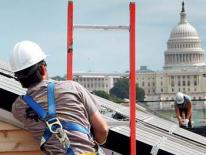
This page was updated in February 2023 to include the progress the District has made in implementing the Clean Energy DC Omnibus Amendment Act of 2018. To stay up-to-date on the latest Clean Energy DC news, sign up for the CEDC newsletter >>
The Clean Energy DC Omnibus Amendment Act of 2018 (the CEDC Act) represents one of the country’s most aggressive and impactful clean energy actions to-date and establishes the District of Columbia as a global leader in the fight against climate change. The Act codifies several key initiatives identified in the Clean Energy DC Plan (“the Plan”)—the District’s detailed energy and climate action plan to halve greenhouse gas emissions by 2032.
The CEDC Act promotes a wide range of new policies and initiatives that primarily target energy supply, building energy use, and greenhouse gas emissions from vehicles. Workforce development, equity and the promotion of Certified Business Enterprises (CBEs) have also been strengthened throughout the plan. The District government is working with its community and private sector partners to implement the mandates of the CEDC Act.
The following provides a high-level summary of the Act’s provisions and implementation progress:
100% Renewable Electricity by 2032
The Act revises the District’s Renewable Energy Portfolio Standard (RPS) to make it one of the most aggressive in the country, mandating 100% of the District’s energy supply comes from Tier 1 renewable energy sources by 2032. By 2041, at least 10% of that energy must come from solar energy generated within the District. The solar carve out has since been amended by the Local Solar Expansion Act, which mandates 15% local solar by 2041.
Progress update:
- The Public Service Commission is implementing the RPS requirements and the latest information can be found on their website.
Buildings and Energy Efficiency
Building energy use accounts for nearly 75 percent of the District’s greenhouse gas emissions. The legislation takes aggressive and innovate action to target this sector, most notably with the first-of-its-kind Building Energy Performance Standard (BEPS). BEPS establishes a minimum energy performance for commercial and multifamily buildings. In addition to BEPS, the Act establishes a number of other initiatives and policies that will help reduce energy consumption and support the local green economy, including:
- Increasing funding for programs that benefit low-income communities, establishing workforce programs and building a pipeline of local businesses with energy expertise;
- Expanding utility energy efficiency and demand programs;
- Promoting energy efficiency at municipal buildings through the development of a Strategic Energy Management Plan.
Progress update:
- The District develop and is implementing the nation’s first Building Energy Performance Standards program. More information on the program and resources related to the program can be found on DOEE’s BEPS website.
- To support BEPS implementation, the District government funded the creation of the Building Innovation Hub, launched the Affordable Housing Retrofit Accelerator, and has expanded the resources of the DC Sustainable Energy Utility and the DC Green Bank.
- The Public Service Commission is managing the utility energy efficiency and demand response programs under Formal Case 1160.
- The Department of General Services developed and published the Energy Management Plan for District-owned buildings.
Transportation Electrification
Second only to buildings, transportation generates around a quarter of the District’s greenhouse gas emissions. The Act establishes three initiatives that will help the transition from traditional vehicles to electric vehicles, while recognizing the city’s broader goal of promoting transit, walking and biking.
- Vehicle Excise Tax: The Act calls for the vehicle excise tax formula to be revised to incentivize electric and fuel-efficient vehicles over less efficient vehicles, with certain provisions to protect low- and middle-income residents.
- Transportation Electrification Program: The Act mandates that 100% of public buses, public fleets, private fleets of more than 50 vehicles, and taxis and limousines are to be zero-emission by 2045 (and 50% zero-emissions by 2030). It includes a provision to incentivize the development of electric vehicle charging infrastructure, including the authorization of the Public Service Commission to consider the electric company's application to build infrastructure that promotes the deployment of electric vehicles.
- Clean Vehicle Transition Plan: The Act calls for the development of a strategy that includes both policy recommendations and cost estimates to achieve the following: (1) at least 25% of vehicles registered in DC be zero-emission by 2030; (2) 100% replacement of public and school buses to electric public buses upon end of their useful life beginning in 2021; and, (3) implementation of the Mayor’s Transportation Electrification Program.
Progress update:
- The vehicle excise tax incentivizing fuel-efficient and electric vehicles became effective February 1, 2021.
- The Transportation Electrification Program and Clean Vehicle Transition Plan were consolidated into one program, Learn more about the Transportation Electrification Roadmap (TER).
Sustainable Energy Infrastructure Capacity Building and Pipeline Program
Along with reducing greenhouse gas emissions, the Act proposes new programs to support local businesses and residents. Title III calls for the creation of the Sustainable Energy Infrastructure Capacity Building and Pipeline Program to increase the participation and capacity of certified business enterprises (CBEs) in the energy efficiency and renewable energy industries. Among other things, the program will include collaboration among agencies to maintain a training and certification program for CBEs and CBE-eligible firms to increase their capacity to engage in renewable energy, and energy efficiency design, construction, inspection and maintenance.
Progress Update:
- The District worked with the DC Sustainable Energy Utility to establish the Train Green Sustainable Energy Infrastructure Capacity Building and Pipeline Program (“Train Green”). More information on the training program and existing offerings can be found on the DC SEU’s Train Green website.

